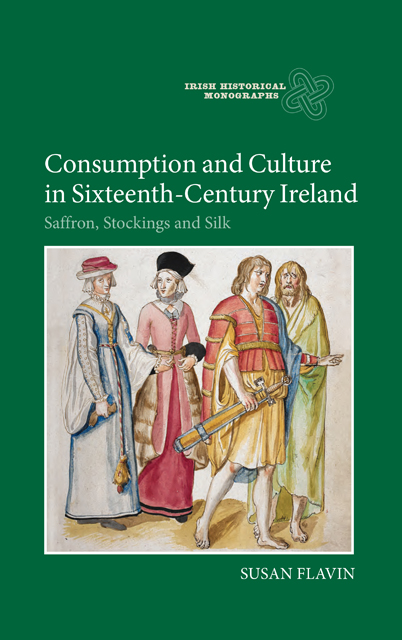9 - The Grape and the Grain
Published online by Cambridge University Press: 24 February 2023
Summary
Ale, beer and cider
Comparing the dietary components of England and Ireland during the sixteenth and seventeenth centuries, Clarkson and Crawford noted that beer was in short supply in Ireland. Army victuallers apparently found it difficult to buy hopped beer in Ireland, and English soldiers disliked the local unhopped ale. In 1580, for example, Lord Burghley instructed a Bristol Merchant, John Bland, to ship 2,000lb of hops to Ireland, telling him that there was the ‘gravest want of hopps in that country’. Bland was also instructed to send brewing equipment and four coopers for a month, at a total cost of £106.
Contemporary evidence also suggests that the taste for hopped beer was slow to develop in Ireland. Fynes Moryson noted that the ‘common sort’ of ‘English-Irish’ drink was ‘not English beer made of malt and hops, but ale’. While he noted that the Gaelic Irish did not have:
… any beer made of malt and hops, nor yet any ale – no, not the chief Lords, except it be very rarely; but they drink milk like nectar, warmed with a stone first cast into the fire, or else beef broth mingled with milk.
Nevertheless, Gaelic Irish literature suggests that beer was consumed by the Gaelic Irish elite and was even considered to have restorative properties. In 1592, the Annals of the Four Masters record the escape of Hugh Roe and Art and Henry O’Neill from prison in Dublin and their subsequent adventures in the Wicklow mountains, where:
Fiagh immediately ordered some of his servants of trust to go to them, taking with them a man to carry food, and another to carry ale and beer … As to Hugh, after some time, he retained the beer; and, after drinking it, his energies were restored.
Clearly then, by the 1590s, the taste for hopped beer had to some extent penetrated even the most ‘secure and impregnable’ parts of Gaelic Ireland. It is likely, however, that its use was restricted to the upper classes initially. Luke Gernon, writing in 1620, noted a distinction between the drinking habits of different classes in Ireland, remarking that in the ‘baser cabins you shall have no drink but bonyclabber, milk that is sowred to the condition of buttermilk’.
- Type
- Chapter
- Information
- Consumption and Culture in Sixteenth-Century IrelandSaffron, Stockings and Silk, pp. 173 - 184Publisher: Boydell & BrewerPrint publication year: 2014

